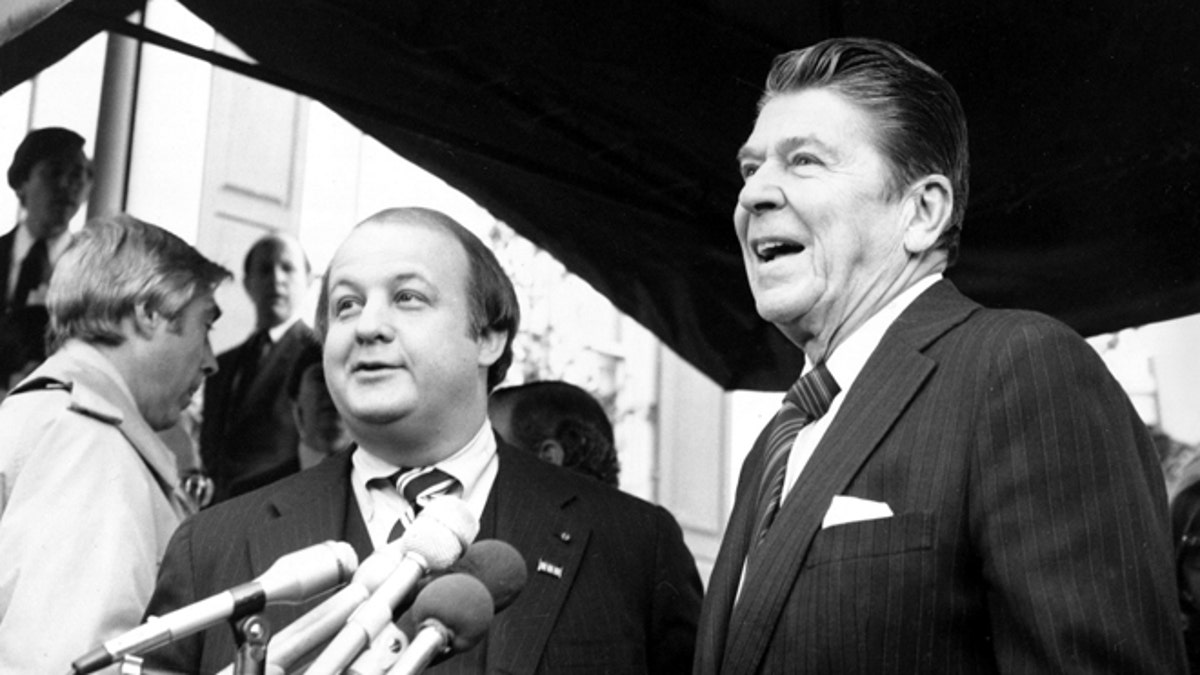
Jan. 6, 1981: President-elect Ronald Reagan introduces James Brady as his press secretary in Washington. (AP)
A medical examiner has ruled the recent death of former White House press secretary James Brady, who was wounded in the 1981 assassination attempt on President Ronald Reagan, a homicide, raising the possibility John Hinckley Jr. could be charged with murder.
Members of the Metropolitan Police Department’s Homicide Branch, the United States Attorney’s Office, and the Federal Bureau of Investigation are reviewing the case, according to a police press release issued Friday.
During the assassination attempt Hinckley shot Brady, who lived through hours of delicate surgery and further operations over the years, but never regained normal use of his limbs and was often in a wheelchair. He died Monday at 73.
The autopsy revealed the cause of death to be “a gunshot wound and consequences thereof ,” the police statement said, and the death was ruled a homicide.
District police spokeswoman Gwendolyn Crump said the department was notified of the homicide ruling Friday.
Hinckley attempted to assassinate Reagan outside the Washington Hilton Hotel on March 30, 1981, just two months into the new president's term. Reagan nearly died from a chest wound. Three others, including Brady, were struck by bullets from Hinckley's handgun.
Hinckley, now 59, was found not guilty by reason of insanity of all charges in a 13-count indictment, including federal counts of attempted assassination of the president of the United States, assault on a federal officer, and use of a firearm in the commission of a federal offense, as well as District of Columbia offenses of attempted murder, assault, and weapons charges. The District of Columbia offenses included charges related to the shooting of Brady.
William Miller, a spokesman for the U.S. attorney's office in Washington, said the office "is reviewing the ruling on the death of Mr. Brady and has no further comment at this time."
Calls to Hinckley's attorneys were not immediately returned. Barry Levine, Hinckley's long-time attorney, has said in court hearings that Hinckley is not a danger.
Officials at St. Elizabeths Hospital in Washington, where Hinckley is a patient, have said that the mental illness that led him to shoot Reagan in an effort to impress actress Jodie Foster has been in remission for decades. Hinckley has been allowed to leave the hospital to visit his mother's home in Williamsburg, Virginia, and can now spend more than half of his time outside the hospital on such visits.
Besides partial paralysis from brain damage, Brady suffered short-term memory impairment, slurred speech and constant pain.
Brady undertook a personal crusade for gun control after suffering the devastating bullet wound. The Brady Law, named after him, requires a five-day wait and background check before a handgun can be sold. President Bill Clinton signed it into law in 1993.
The Associated Press contributed to this report.









































